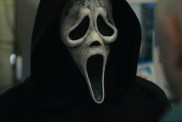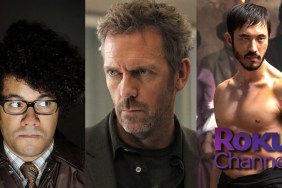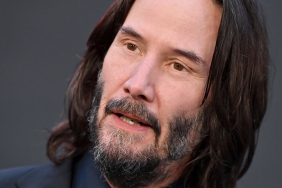Twentieth Century Fox turned a lot of heads at its CinemaCon presentation last week with the first-ever reveal of footage from their upcoming The Secret Life of Walter Mitty, directed by Ben Stiller and starring Stiller, Sean Penn, Kristen Wiig, Adam Scott, Patton Oswalt and Shirley MacLaine.
Scripted by Steve Conrad and based on the 1939 short story by James Thurber (previously adapted for the screen in 1947 with Danny Kaye in the lead), the film follows the life of the titular Walter Mitty, a photo editor for LIFE magazine who spends most of his days inside his own fantasies. When he realizes that he’s missed out on the adventures that life has to offer, Mitty decides to go on a grand adventure to Iceland to locate a missing photograph, thinking all the while of Cheryl (Wiig), the literal girl of his dreams, to help drive him forward in search of his true self.
ComingSoon.net had to opportunity to speak with Stiller and Wiig at a press conference following the footage and you can read about their thoughts on the release below, including details on filming on location, balancing the realistic tone with the story’s fantasy elements and even how advice from Russell Crowe helped the crew face Iceland’s harsh elements.
Q: Ben, you said this was your most fulfilling film experience. What was so good about working on this?
Ben Stiler: You know, its just been such a full experience and [I’m not] kidding, we are still working on it. Its been a very long and complex experience in terms of the development of the script with Steve [Conrad] and the story. I think it all starts with the material and the script that Steve wrote and what he was aspiring to in the script. So, I guess to be in that territory, for me, was a little scary because it was new. Looking at a movie and not looking at it as a director and not necessarily just as a comedy. Having different criteria in how to connect with an audience and tell the story in a way that serves the story and allows people to feel what you would hope they would feel. That whole process has been great and exciting. Then just working with the cast and the actors and how everybody, I think, felt working on the movie from the beginning. They all felt connected to what Steve had written and what we were trying to do. Its had so many aspects. Working on the visual effects, going to Iceland, doing a scene with a comedic genius person. But seriously, its just a lot of different things and so thats, I think, good.
Q: The film is very much about following your dreams and living your own life. Is there anything in your own lives thats unexplored? Some desire that you have or some place that you want to go?
Kristen Wiig: Like an actual place? Actually, it was very inspiring for me to watch Ben directing and acting in this movie, because I do hope to do that someday. Maybe direct something, so I feel like that was kind of a free class for me. To get to watch how its actually done. I dont know how he wore so many hats on this thing and, also, it was a challenging movie to do with all the special effects, the CGI. Then hes acting with age makeup. It was a lot of stuff. To watch him work and see how you do it while also being cool and nurturing and generous, I feel lucky to have watched that. Its weird to talk about it when hes right next to me.
Stiller: Id love to travel more. I really look forward to traveling with my kids. Im just waiting for them to want to travel with me.
Wiig: I want to travel with your kids too. Thats my second fantasy.
Stiller: No, you dont. Believe me. You know, as far as going to different places, Id love to go to Asia. Ive been to Japan, but Ive never been to China. Id love to go to China. I dont know. I like to go to places that are remote. I think Id like to do that more, just sort of also explore, not having a structured work life someday. To have more free time to sort of see what happens.
Q: This film seems completely divergent from “Zoolander” and “Tropic Thunder.” Was this kind of tone something that you really wanted to explore?
Stiller: Yeah. I think that all came from Steves script, really. Steve and I talked about it. It was trying to find this reality that felt real, but also allowed for where the story goes. Because I do think its kind of a little bit hyper-real, but I felt like it was important. It was a tone that people always felt could be happening. Honestly, I think that, for any movie, the tone of the movie has to be consistent. Thats the key to a movie. In “Zoolander,” its like a really crazy world — or “Tropic Thunder.” But you have to stay consistent. For this movie, I think it was a little bit different because the tone was a little more realistic, but not quite too [realistic]. It was intentionally a little bit stylized, too.
Q: Could you talk a little bit about the theme of the original short story?
Stiller: The short story. I remember reading it as a kid in school and it stuck with me. I remember there was a lot of things, like the phrases in it, that I didnt quite understand. I think the first time I ever read the phrase Coals to Newcastle, I didnt know what it meant. It really stuck with me as I got older, the idea of the life that you lead being the one that you end up living as opposed to what you imagined it being. You get to a certain point in your life where you start going, Wait, Ive lived a lot of my life. I keep on thinking this is going to happen or I dream about this happening, and it didnt quite happen. Yet, maybe. So that theme of being in your life and kind of always thinking, “What do I want it to be?” Doing that, you sort of lose touch with the moment, was something that I thought, in Steves script, was really there. The ability to sort of be in the present moment. Walter is always thinking about what he wants to do or what he wants to be, but hes not there in the moment.
Wiig: I think, no matter what kind of life you have, whether it looks one way to people or another way, you always have moments when you imagine a different life.

Q: You’ve said how much a fan you are of the script. Did it change much once the full cast came aboard?
Stiller: First off all, I think it has a very Conrad-ian tone. I really think he has his own tone. As Ive said, Ive been a fan of his from other movies and we actually worked on another movie together that hasnt gotten made. I knew him a little bit and hes a really flexible writer. He likes to rewrite and he likes to think of actors. I know when Kristen came aboard, he got really excited, because it was a chance for him to imagine her voice and get more specific with who Cheryl was. He enjoys that process and I think that, for me and Steve, the year we spent working on the script before we went to the stages of pre-productions, a lot of time was spent trying to hone in on the tone we were talking about. In terms of the voice for Walter, I always felt like he had a clear sense of what that was. It was less about tailoring the voice and more about trying to get the story to a place [we liked]. He has a lot of very amazing images and moments that happen, and I think we both worked towards trying to make it a story you could believe could happen, because it goes to these sort of amazing places. That was a lot of what the work was.
Q: The Walter character seems very realistic.
Stiller: Realistic, yes. I think its impossible for Sean to not be realistic.
Q: Was it was difficult to find an equilibrium between reality and imagination for the film?
Stiller: I think its really an editorial process more than anything, the balance of the fantasies to reality. In the writing of the script, I think it was the idea, like I said before, of the tone and trying to keep it consistent, allowing for this world where you could buy that these things would happen and a guy would go off into the world and jump on a plane and meet these people. There are movies I remember like “Local Hero,” that I remember having a really great tone. It was comedic and kind of quirky, but also real and soulful. I got inspired by movies like that or like “Being There.” I think with Sean, it was really about making this character a real person, because hes kind of mythic in the story. When we do meet him and finally see him in the story, I want him to be a real person. Sean actually, himself, really brought a lot of ideas for what Sean O’Connell in the movie would say, that were great and became part of the script. He also brought a lot of humor to it. Again, its the type of movie where I wanted the audience to be able to enjoy what was happening in the film on a level where theyre not sort of feeling like now its serious, now its funny. Its all kind of okay and Sean brought that to it. You have to remember, Sean is a really funny actor. You know, hes Jeff Spicoli, which is one of the greatest comedic performances on film.
Q: I think we were all surprised at how beautiful the footage is. Im curious about the conversations you had with your cinematographer and how that partnership was formed.
Stiller: Well, we had a pretty clear idea of what we wanted the movie to look like and I think that just comes from talking and looking at pictures together and references and watching movies together. Then, when you get to Iceland and its such an incredibly beautiful place and the light is so amazing that its hard not to shoot stuff that looks good there.
Wiig:: Yeah, the movie is breathtaking to see the whole thing. There are shots that are really amazing.
Stiller: I think that a lot of that comes from the diligence of, going out and keeping trying to get that moment. We were lucky enough to have this really great small second unit of like three guys. This great cinematographer named Erik Wilson, who shot a movie called “Submarine,” a British movie. I had met him because our company had executive produced it a couple years ago, and hes incredibly talented. He was our second unit DP, and every day him and Phil Nielson, who is our second unit director and Michael Luhrmann whos an incredible AD, who does big movies, but he was our second unit guy. Every day they would go out, and we had a list of things we would try to get. And then some days I would meet up with them for a shot at the end of the day or at the beginning of the day, and we would keep on going back and back until we felt like we had a good version of stuff. Then we started a catalog of a lot of stuff that we could use. But then, honestly, we just got lucky. We got very lucky, because the weather in Iceland changes so quickly. There are scenes — you saw a couple of cuts — theres a scene where hes skateboarding down a mountain and we had two days to shoot it because wed only be there those two days. The day before we were there, the whole mountain was just socked in and you couldnt see anything. And then it miraculously opened up for us for two days. Things like that happened along the shoot. It was special.
Wiig: Yeah. It was kind of magical.
Stiller: I saw Russell Crowe in Iceland before because they were shooting “Noah” there. They were just leaving when we came and he said, (imitating Crowe) You gotta dominate the weather. And I was like, Okay. I will make sure to dominate the weather. Thanks Russell. But he was right. He was right because you couldnt wait around for a cloud to leave. You just had to go and do it and its going to change, its going to be different. And somehow, the weather respects you for going forward. So it was an amazing time.
Wiig: Yeah, you got through that windstorm.
Stiller: Yeah. Well, the windstorm ended up being great. It helped us, because we had to shut down for a couple days and it was a point in the shoot where we all needed to shut down anyway and just take a second. It gave us a chance to rehearse more. So all of these things seemed to fall in place and it was just an amazing experience being there. It was great.
Q: I was gonna ask you about your scenes with nature in Iceland. There was a shot in the footage with a shark in the water. How did you film that?
Stiller: Right. Yeah. That was just luck. What we did is we waited for the seas to-

Wiig: (laughs) We waited for a shark.
Stiller: We waited for a shark.
Wiig: We were so lucky he went right into the camera (laughs). We just put a piece of meat right over the-
Stiller: We waited for swells to come up because we needed a storm, which, literally in the last two days that we were there the swells came up big enough so that we could shoot the scene, so that we could jump in the water and get the trawler out there. The light condition just ended up being what it was which was like this Icelandic light and again we got lucky enough that it was consistent enough for a couple of days.
Wiig:: But Ben was like in the water fully, doing all of that stuff.
Q: So no real sharks?
Stiller: Oh yeah. No, no. We had fake sharks (laughing). Still working on the fake sharks.
Q: Kristen, weve seen you as a variety of characters on “SNL.” Did you enjoy the fact that with this movie, you could play different versions of your character?
Wiig: Yeah, it was kind of like the best of both worlds because of the different fantasies that Walter goes into. He imagines different versions of me because Im his love interest in the movie and yeah, it was kind of like a good meeting of those two worlds. In movies youre obviously the same character, same wardrobe, same everything for months, whereas “SNL” is different every four minutes or something. Yeah, it was fun to do that.
Stiller: Can I say something?
Wiig: Yeah.
Stiller: I just think Kristen is — I wouldnt say an underrated actress, because I feel like people havent had the chance to see you in roles like this — Shes just so realistic and so funny. Thats really not an easy thing to do and to be and I think whats exciting for me in this movie is people seeing you in that and yet she also gets to be really Kristen funny too. But, I think thats why shes so successful as an actress and a comedic actress is that, people can feel shes a real person too and thats just a crazy combination of things that not many people have.
Q: Was there anything from the 1947 version of the film that carried over?
Stiller: There was not much, because I really feel like that movie is wonderful on its own and Danny Kaye was so talented in such specific ways that I am not. I did not want to attempt that. The thing I did learn, because John Goldwyn, our producer, his grandfather did that movie. Weve had the same sort of experience of putting the film together where, as you try to figure out the balance of fantasy and reality, how that works, and fantasies that you shoot but you dont end up using, how to tell the story and moving the story forward while still having time. Going to the fantasies but not going to the fantasies for too long so the story can move forward, because the audience really wants the story to move forward, but yet, the movies about the fantasies. Apparently, they had those same issues when they were making their movie and so we learned that thats been a constant thing with the Mitty story.
Q: Kristen, we see you singing David Bowie’s “Space Oddity” in the footage. Are you a particular Bowie fan?
Wiig: I am a big David Bowie fan. That was a little bit intimidating to know that I had to sing that song, but Ben described that scene to me. Very early on, he kind of had that imagined a while ago, and I was so excited. I took guitar lessons and recorded the song in New York. It was kind of a dream. I got to pretend I was a recording artist for a couple days.
Stiller: Yeah. That was exciting to hear her record it in the studio, because shes a really good singer, and, what was it like, Electric Lady Studios?
Wiig: Yeah.
Stiller: So it was like, a pretty famous studio.
Q: Was being on location and witnessing the Northern Lights as inspiring as we all imagine?
Wiig: Its beautiful, yes.
Stiller: Incredible.
Wiig: We were at a restaurant and you couldnt really see them, so we all hiked up this crazy mountain and watched them. It was one of those, like “where are we?” moments.
Stiller: Its actually in that scene — the scene with the pilot in the pub. Theres like a bluff outside the helicopter in one shot and we all went out to that bluff in the middle of the night and it was incredible.
Q: You said youre still working on the film. Whats the current stage of post production?
Stiller: Just the visual effects and editing, and basically where youre at in a movie at this point when its coming out at Christmas time. So, yeah. Thats actually been a great thing to have the time on a film like this to really figure out the best balance in the story.

Q: Ben, how tricky is it to balance producing, directing and starring? Also, did you have a particular connection to Bowie?
Wiig: Im gonna talk about you first.
Stiller: Okay, okay.
Wiig: I had worked with Ben just a little bit when he hosted “SNL” and we got along really well. Ive been a fan of his for a long time. Seeing him be the director and, you know, hes in his costume and then, two seconds later, hes behind the camera and totally and completely Walter and there for you as an actor. Again, I know Im repeating myself, but just watching him do all of those different jobs so well and so calmly and so patiently was, you know as an actor you never wanna see the director freaking out about anything. So, you feel very safe and taken care of. And also, hes very organized and knows exactly what he wants which is so great as an actor. We would rehearse and he just, like you were saying, this has been a passion project. That term is gonna get thrown out there a lot, for years, and its so exciting to be a part of a movie with someone whos had this movie in his brain and his heart for years and years and years. To be a part of that, you feel really lucky that hes brought you into to his little club.
Stiller: Yeah. First of all the Bowie song is just an amazing song. It has that emotion and its always had that and, it was exciting to be able to use it in this context. I felt like the way it fits into the story, and the way that Steve used it, we got to this point and this scene which was sort of how the fantasy and reality come together for Walter, and that was what that came out of. That song, and what he mentioned in his head, and what he imagines and what he does, it all just seemed to come together over that song. I love that song and that era, that Bowie era. “Changes” has always been another favorite Bowie song of mine. In terms of the acting and directing thing, its just a lot of prep time. I was lucky enough on this movie to have a lot of prep time, so we had time to work on all this stuff before hand, and then we were lucky enough to have great people who came on board, both in the crew and the production designer and cinematographer, costume designer, everybody. Then, with the actors who came on and really got it and were excited to be a part of it, you know Kristen would say something and then shed do a rehearsal and say what if I said this? or what if I said that? Its incredible and great. It adds so much, so that process, when everybodys there and sort of on the same page, thats all you can ask for, and then it kind of goes from there and it is what it is.
The Secret Life of Walter Mitty hit theaters December 25.
(Photo Credit: TNYF / Nikki Nelson / Dan Jacman / WENN.com)









